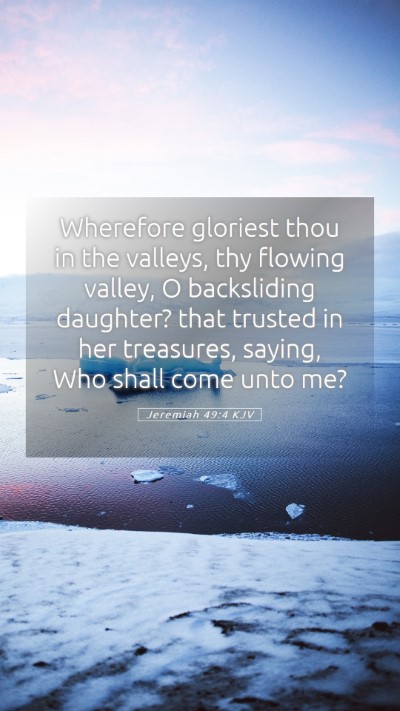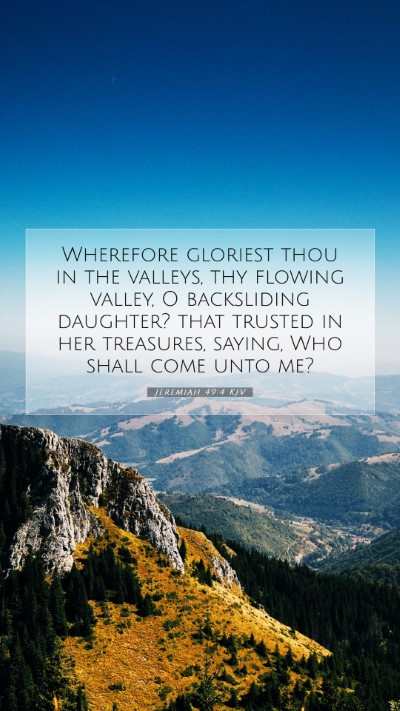Bible Verse: Jeremiah 49:4
Verse Text: "Why dost thou glory in the valleys, thy flowing valley, O backsliding daughter? that trusted in her treasures, saying, Who shall come unto me?"
Bible Verse Meaning and Interpretation
This verse from Jeremiah serves as a poignant reflection on the hubris and false security of a nation described metaphorically as a "backsliding daughter." It highlights a sense of misplaced confidence in material wealth and earthly treasures.
Insights from Public Domain Commentaries
Matthew Henry's Commentary
Matthew Henry emphasizes that this verse addresses the pride and self-reliance of those who rely heavily on their material possessions. The "flowing valley" can be seen as a metaphor for prosperity, which has led to complacency and a lack of dependence on God. The prophet Jeremiah, in calling the nation a "backsliding daughter," indicates a deviation from prior faithfulness, suggesting that their current state is not one of trust in the Lord, but rather in their fleeting riches.
Albert Barnes' Notes on the Bible
Albert Barnes elaborates on the rhetorical question posed in the verse, noting that it serves to challenge the nation's confidence. The question "Who shall come unto me?" illustrates a false sense of security; they believe that their treasures can protect them from impending judgment. Barnes points out that the valleys symbolize places of abundance, yet this abundance is leading them away from true reliance on God.
Adam Clarke's Commentary
Adam Clarke interprets the verse as a discourse on the folly of trusting in riches. He notes that the term "backsliding daughter" implies a betrayal of the covenant with God, and that the location and abundance of blessings are being misinterpreted as invulnerable defenses. Clarke stresses the importance of recognizing that no amount of wealth can ensure safety without divine favor.
Key Themes
- Misplaced Trust: The verse highlights the danger of placing trust in wealth rather than in God.
- Complacency: Prosperity can lead to a false sense of security and spiritual apathy.
- Spiritual Backsliding: The metaphor of a "backsliding daughter" portrays the departure from faithfulness to God.
- Impending Judgment: The rhetorical questions imply an upcoming reckoning due to their unfaithfulness.
Applications to Daily Life
Understanding Jeremiah 49:4 can offer profound insights into how we approach our own lives today:
- Assess where you place your trust: Is it in your possessions or your relationship with God?
- Reflect on the nature of your blessings: Are they leading you closer to God or making you complacent?
- Recognize the temporary nature of material wealth and focus on eternal treasures.
Bible Cross References
- Proverbs 11:28 - "He who trusts in his riches will fall, but the righteous will flourish like foliage."
- Matthew 6:19-21 - "Do not lay up for yourselves treasures on earth... but lay up for yourselves treasures in heaven."
- Jeremiah 2:13 - "For my people have committed two evils: They have forsaken Me, the fountain of living waters, and hewn themselves cisterns, broken cisterns that can hold no water."
Final Thoughts
Jeremiah 49:4 serves as a reminder of the dangers of trusting in earthly possessions over spiritual faithfulness. The emphasis on understanding Scripture in the context of historical and spiritual themes encourages deeper reflection and Bible study insights that can aid in spiritual growth. Whether in Bible study groups or through online Bible study resources, examining verses like this fosters a critical understanding of biblical teachings, ultimately leading to a more enriched faith.


